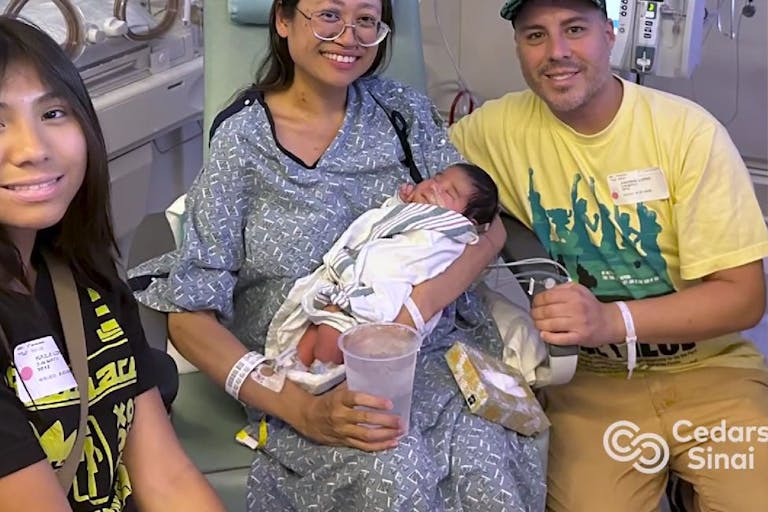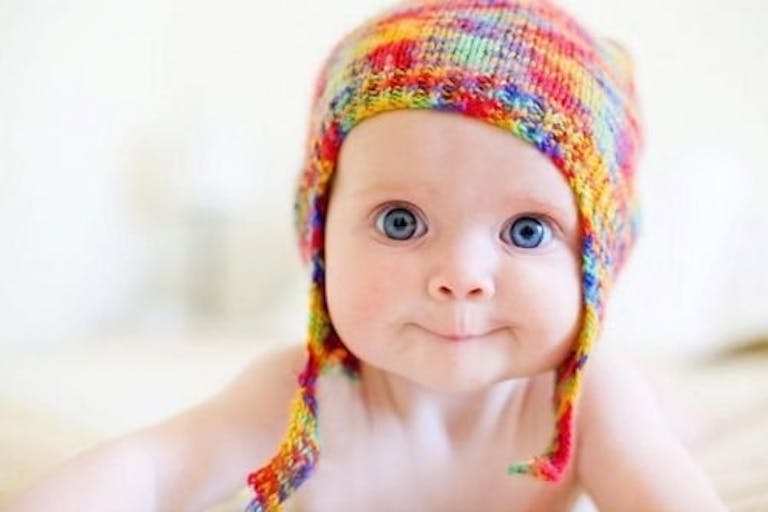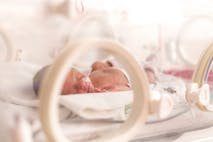
Full term 'miracle' baby born after 'unprecedented' ectopic pregnancy
Bridget Sielicki
·
All (I thought) I wanted was a healthy baby
Peanut and Clifford doing some respiratory treatments.
It’s something most every pregnant woman or father-to-be says: “I don’t care if it’s a boy or a girl, as long as it’s healthy.” Or, “All I want is a healthy baby.” It seems so natural, so caring, so perfectly the right thing to say. After all, no one wants his or her baby to be unhealthy. No one wants to look at a tiny infant and hear that he is sick. But is a healthy baby really all we want? Is it really what we want parents to want? Is it what we want parents of “unhealthy” children to hear us say?
I had a healthy baby for two days. She spent her first four days after birth in the Neo-natal Intensive Care Unit being tested for anything that might have caused the fever she had during labor. Nothing was found, and we were sent home with our healthy baby. Two days went by, and on the evening of that second day, we were told our baby had cystic fibrosis. She was not the “healthy” baby we had prayed for, spoken about, or expected.
But she was still our baby. And she was and is very much wanted.
The truth is that we wanted our baby, healthy or not. She could have had twelve toes or no arms, and we still would have wanted her.
All I want is a healthy baby. (I don’t want an unhealthy baby.)
When we say we don’t care if it’s a boy or a girl as long as it’s healthy, are we really saying that we won’t care about our child if she’s not healthy?
When we say all we want is a healthy baby, does that mean we won’t want our baby once we find out she’s not healthy?
Unfortunately, for a lot of parents, the answer is yes. This is how the world has come to think of our children. So very many parents abort their wanted babies after finding out that their babies are not “perfect.” A diagnosis of everything from cystic fibrosis to Down syndrome can mean death before birth for the majority of those once wanted babies each year.
And is it all because of that one seemingly innocent phrase?
Article continues below
Dear Reader,
Have you ever wanted to share the miracle of human development with little ones? Live Action is proud to present the "Baby Olivia" board book, which presents the content of Live Action's "Baby Olivia" fetal development video in a fun, new format. It's perfect for helping little minds understand the complex and beautiful process of human development in the womb.
Receive our brand new Baby Olivia board book when you give a one-time gift of $30 or more (or begin a new monthly gift of $15 or more).
When parents learn that their unborn baby isn’t “healthy,” they face pressure from doctors and listen to advice from family and friends who say that it will be better to abort. After all, their baby won’t have the life that the parents had expected or hoped for or prayed for. Their baby will struggle and face more challenges than her peers. And the parents won’t have that idealized image of parenting. There will instead be frequent doctor visits, hospitalizations, special education plans, and paperwork. So very much paperwork. It isn’t what the parents signed up for. But life so seldom is.
So many mothers, after aborting their wanted but unhealthy babies, struggle with depression. Now all they want is their baby – healthy or not.
All I want is an (insert preference) baby.
What if we substituted other words for healthy? Like blue-eyed. Or heterosexual? Or smart? Or cute? Or a boy? How would we sound then? Perhaps selfish. Perhaps discriminatory. So why then is it so acceptable to say we want only a healthy baby?
I get it. I do. I’ve said it myself. Of course we want our children to be healthy. And we also want our children to be smart. And we want our children to be cute, well-behaved, easy-to-potty-train tiny versions of the best of us. And some of us want our children to be football stars or doctors. But there will be many times during our lives as parents when our children do things or say things that we don’t want them to. When they choose a career we didn’t expect or marry someone we didn’t expect or when they get sick. But don’t we still want them?
My second and third children had a 25% chance of having cystic fibrosis, and I knew that people expected me to be worried, expected me to be testing them before birth to find out. But I wasn’t worried. Either way, cystic fibrosis or not, they were my babies, and they were wanted. There’s no test to measure the value of a person’s life.
Let’s stop feeling the need to say that all we want is a healthy baby. Everyone wants that. You’re not a better parent because you said it out loud. But you are a phenomenal parent right from the get-go if you decide, accept, and announce:
All I want is MY baby.
Despite the risks, despite the struggles, despite their imperfectness. They are our babies.
Live Action News is pro-life news and commentary from a pro-life perspective.
Contact editor@liveaction.org for questions, corrections, or if you are seeking permission to reprint any Live Action News content.
Guest Articles: To submit a guest article to Live Action News, email editor@liveaction.org with an attached Word document of 800-1000 words. Please also attach any photos relevant to your submission if applicable. If your submission is accepted for publication, you will be notified within three weeks. Guest articles are not compensated (see our Open License Agreement). Thank you for your interest in Live Action News!

Bridget Sielicki
·
Guest Column
Emily Berning
·
Opinion
Nancy Flanders
·
Opinion
Mark Wiltz
·
Opinion
Mark Wiltz
·
Pop Culture
Madison Evans
·
Issues
Nancy Flanders
·
Human Interest
Nancy Flanders
·
Investigative
Nancy Flanders
·
Pop Culture
Nancy Flanders
·
Human Interest
Nancy Flanders
·